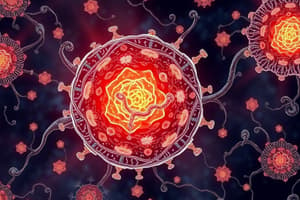Podcast
Questions and Answers
What is the difference between hypoxia and ischemia?
What is the difference between hypoxia and ischemia?
Hypoxia refers to oxygen deprivation with maintained blood flow, while ischemia is greatly reduced or interrupted blood flow.
What are the potential signs of severe and sudden hypoxia?
What are the potential signs of severe and sudden hypoxia?
Drowsiness, impaired problem solving, convulsions, unconsciousness.
What can result in global ischemia?
What can result in global ischemia?
Generalized low blood flow, as in cardiac arrest.
What may lead to the depletion of energy resources in the brain during ischemia?
What may lead to the depletion of energy resources in the brain during ischemia?
What is the consequence of local occlusion of a cerebral blood vessel?
What is the consequence of local occlusion of a cerebral blood vessel?
What are the two axonal transport systems mentioned in the text?
What are the two axonal transport systems mentioned in the text?
Which cells are included in the supporting cells of the nervous system?
Which cells are included in the supporting cells of the nervous system?
What is the purpose of the myelin sheath formed by supporting cells?
What is the purpose of the myelin sheath formed by supporting cells?
What are action potentials?
What are action potentials?
Describe the three phases of action potentials.
Describe the three phases of action potentials.
What happens during depolarization in terms of ion movement?
What happens during depolarization in terms of ion movement?
What are the two main types of synapses mentioned in the text?
What are the two main types of synapses mentioned in the text?
What type of messengers do chemical synapses rely on to transmit signals between neurons?
What type of messengers do chemical synapses rely on to transmit signals between neurons?
Name three major types of neurotransmitters in the brain mentioned in the text.
Name three major types of neurotransmitters in the brain mentioned in the text.
Which neurotransmitter mediates the most synaptic inhibition in the CNS?
Which neurotransmitter mediates the most synaptic inhibition in the CNS?
What type of neurons in the spinal cord release acetylcholine?
What type of neurons in the spinal cord release acetylcholine?
Which neurotransmitter do inhibitory spinal neurons release?
Which neurotransmitter do inhibitory spinal neurons release?
What is the Monro-Kellie hypothesis related to?
What is the Monro-Kellie hypothesis related to?
Define Compliance in the context of the brain.
Define Compliance in the context of the brain.
Which intracranial volume is the most easily displaced?
Which intracranial volume is the most easily displaced?
What does Cerebral Perfusion Pressure (CPP) represent?
What does Cerebral Perfusion Pressure (CPP) represent?
What is Hydrocephalus and how can it develop?
What is Hydrocephalus and how can it develop?
What is a Cerebrovascular Disease?
What is a Cerebrovascular Disease?
What is the most common type of stroke, representing 88% of cases?
What is the most common type of stroke, representing 88% of cases?
What is the main cause of hemorrhagic stroke?
What is the main cause of hemorrhagic stroke?
What is the main risk factor for stroke that increases with age?
What is the main risk factor for stroke that increases with age?
What transient condition is characterized by focal ischemic cerebral deficits lasting less than 24 hours?
What transient condition is characterized by focal ischemic cerebral deficits lasting less than 24 hours?
What is the main manifestation of acute stroke that is described as sudden and one-sided?
What is the main manifestation of acute stroke that is described as sudden and one-sided?
What is the term used to describe vision loss in one eye that can be a manifestation of acute stroke?
What is the term used to describe vision loss in one eye that can be a manifestation of acute stroke?




